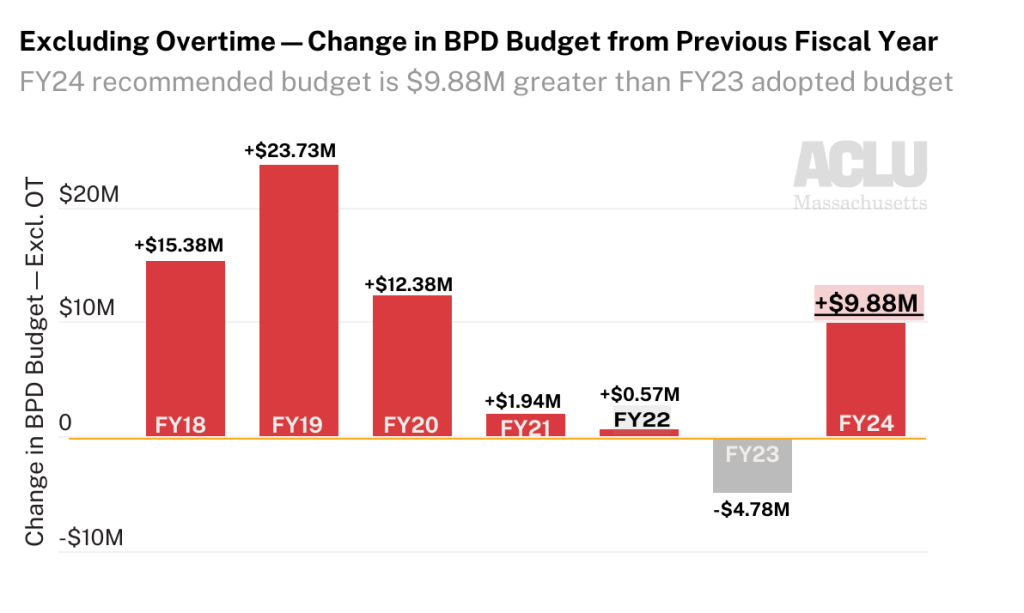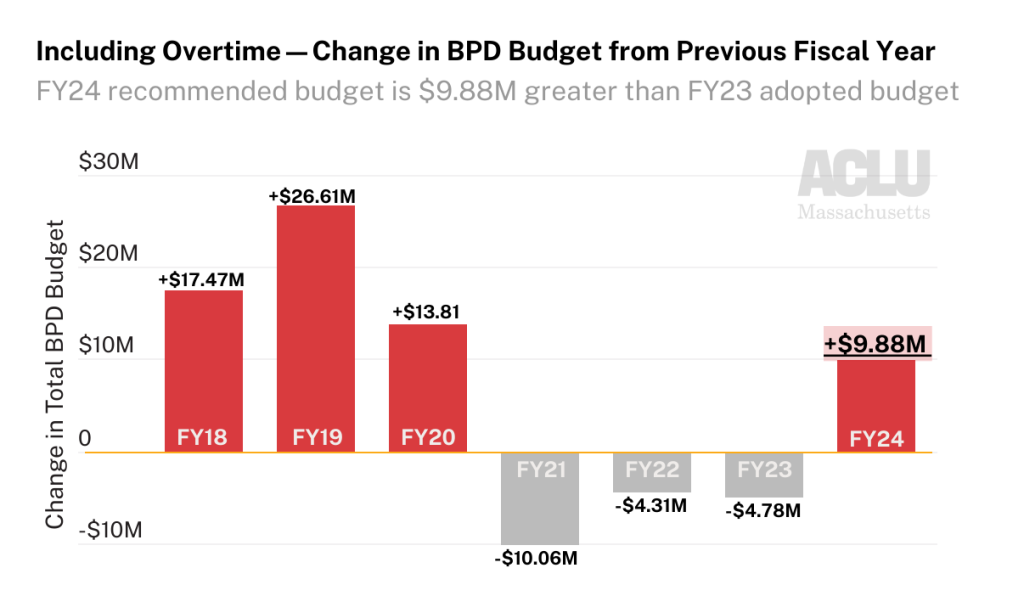See our previous work on policing in Massachusetts
On April 12, Mayor Wu submitted her recommended operating budget for the upcoming fiscal year (FY24) to the Boston City Council, kicking off the public portion of the City’s budgeting process. Among other investments, the Mayor’s budget proposes funding the police department at $9.88 million over its FY23 budget.
Over the coming months, the City Council will review the Mayor’s budget recommendation and can propose and vote on changes. During this same review period last year for the FY23 budget, the City Council unanimously proposed reducing funding for the police department and increasing funding for youth engagement and employment programming, among other proposed changes. These efforts had a limited impact in 2023, however. The Mayor’s budget passed with a few small tweaks from the Council.
This analysis focuses on the Boston Police Department’s (BPD) budget. Our hope is that this breakdown will be useful for community members, journalists, and other interested parties as the City’s various stakeholders and residents engage in conversations and debate on the budget, which are set to take place between now and July. To explore the full recommended operating budget and design your own changes, please see our (Co)Design the Boston Budget calculator tool.
The Mayor’s proposal would increase the Police Department budget by $9.88 million
Of the $4.28 billion city operating budget, the Mayor’s recommended budget allocates $404.97 million to the Boston Police Department.
The recommendation is an increase of $9.88 million from last year’s BPD adopted budget of $395.09 million. (Note: the City’s recommended budget document describes this as a smaller $9 million increase for the BPD budget, comparing the Mayor’s FY24 recommendation to the FY23 appropriation of $395.91 million rather than the FY23 adopted budget of $395.09 million. This analysis compares the FY24 recommended budget to the adopted budget of previous years, not the appropriated budgets.)
In adopted BPD budgets of recent years, there have been significant reductions to the police overtime line item; notably, this FY24 recommended budget does not make additional changes to police overtime. The FY21 and FY22 budgets both significantly reduced the overtime line item from previous fiscal years, and both the FY23 adopted budget and FY24 recommendation preserve those cuts. However, police overtime spending is not constrained by a reduction in the line-item overtime allocation; all police overtime is paid by the city even when it exceeds its appropriation. Since actual overtime spending frequently surpasses its budget line item, the analysis below compares the Mayor’s FY24 BPD budget recommendation both in its entirety and with the overtime line item excluded.
When excluding the overtime budget, the remaining portion of the Mayor’s recommended FY24 BPD budget is the largest in recent years.
The proposed increase in the FY24 police budget represents a shift. In the past few years since 2020, the growth of BPD’s adopted budget has curbed in response to community calls to shift funds from policing into community health and safety initiatives. When excluding the overtime line item, the $12.38 million increase between FY19-FY20 was followed by much lower increases of $1.94 million between FY20-FY21 and $0.57 million between FY21-FY22. Last year’s FY23 adopted budget, also proposed by Mayor Wu, showed a reduction of $4.78 million from the FY22 budget—the first such reduction to non-overtime sections of the budget since at least FY15. An increase of $9.88 million for FY24 would break from the trend of the past few years.


Where is this additional money going?
The bulk of the Mayor’s proposed budget increase for BPD provides funding for police department staff. According to the City’s budget documents, the FY24 recommended budget would fund “a recruit class to replace project attrition” and $582,000 to the Youth Connect program, which provides social workers for police precincts. Last year’s FY23 budget also increased the size of the police cadet class from 60 to 90; it appears that this budget preserves that increase.
Here’s how the BPD’s staffing levels under the FY24 recommendation would compare to other city departments, excluding the Boston Public Schools.
The Mayor’s budget recommendation proposes 2,766 full-time equivalent employees (FTE) at BPD on 1/1/24. This represents:
-
- 3.3x the FTEs of the Public Health Commission
- 7x the FTEs of the Public Library
- 10.3x the FTEs of the Boston Center for Youth & Families
- 11.8x the FTEs of Parks and Recreation
This is an increase of 108.6 full-time equivalent employees compared to 1/1/23, though as city documents note, it is important to bear in mind that the number of employees on January 1 of a given year often varies due to retirement timing and the start of new classes. Budget documents describe this change in staff levels along these lines—as a reflection of last year’s police class being delayed until April 2023.
The size of BPD’s full-time equivalent staff exceeds not just departments but entire city cabinets. The police department is larger than every cabinet besides Education and its own Public Safety cabinet.
Boston has typically had higher-than-average police staffing. As we previously demonstrated using FBI UCR data, in 2021 Boston had more officers per resident than 70 percent of similarly sized cities.
BPD has a higher budget than every city department other than Boston Public Schools
Year after year, the Boston Police Department has the second-largest budget of any department, second only to the Boston Public Schools.
Note: The chart above excludes Boston Public Schools, which has a FY24 recommended budget of $1.45 billion.
Just as the size of the police department staff surpasses nearly all other departments and cabinets, so does the size of its budget. Per the Mayor’s recommended FY24 budget, the BPD budget would be:
-
- 3.2x the size of the Public Health Commission
- 8.5x the size of the Library Department
- 9.9x the size the Environment, Energy, & Open Space Cabinet
- 13.5x the size of the Boston Center for Youth & Families
- 22.5x the size of Youth Employment and Opportunity
Boston Police Department overtime spending
The police department’s funds extend beyond the already-sizable adopted budget; the City pays all overtime costs that the police department incurs even when they exceed the initial budgeted amount. And as we’ve documented the police also receive large amounts of grant funding from the state and federal governments each year.
The department continually exceeds its overtime appropriation. Last year’s overage was particularly substantial, since the FY22 police overtime budget was reduced on paper but actual police expenditures did not decline accordingly. The department spent $72.33M on overtime: similar to previous years’ overtime spending but $28.41M more than budgeted.
To put this overage in perspective, the difference between BPD’s budgeted overtime allocation and its actual overtime spending in one year could fund not just departments but entire City cabinets. $28.41M is enough to cover the FY22 expenditures for the Cabinets of Equity and Inclusion ($9.8M), Economic Opportunity and Inclusion ($7.6M), Community Engagement ($4.22M), Arts and Culture ($3.50M), and Office of Police Transparency and Accountability ($718K) combined, with a couple million to spare. This FY22 overage is also over half of the Boston Public Library’s budget.
For more on BPD payroll and overtime during the 2022 calendar year, please see our previous analysis.
Data Sources
- Boston’s open data portal
- Boston’s City budget website
-
- Current and past fiscal year budgets at bottom of page; information was obtained from the “operating budget” and “public safety cabinet” sections of the budget documents
Explore the FY24 budget recommendation
- FY24 recommended budget document (at bottom of page) and dataset
- (Co)Design the Boston Budget—budget calculator tool helping you design your own operating budget, using the FY24 recommendation as a starting point
(Co)Design the Boston Budget – Budget Calculator
How to get involved
- Members of the public may testify at City Council hearings on the budget, which started this week and will continue through early June. Public testimony, including virtual public testimony, will be accepted at each hearing and at the public testimony hearings.
-
- Resources
-
-
- City Council Budget website – full hearing schedule towards bottom of page
- Public Notice – updated dates and times of hearings
- Boston City Council TV – hearing livestreams
- Guidance on testifying at a budget hearing
-
-
- Schedule for BPD budget hearings, public testimony, and working sessions as of 5/5/23. These are subject to change—confirm hearing dates and times through Public Notice. Both the Ianella Chamber and Piemonte Room are on the Fifth Floor of Boston City Hall:
-
-
- Thursday, May 11 at 10am (Iannella Chamber) – Hearing: BPD Revolving Funds
-
-
-
- Thursday, May 11 at 2pm (Iannella Chamber) – Hearing: Grants, Reform, Community Programs, and Crisis Response
-
-
-
- Thursday, May 17 at 6pm (Iannella Chamber) – Public Testimony: BPD, BFD, Safety, BEMS
-
-
-
- Tuesday, May 30 at 2pm (Piemonte Room) – Amendments Working Session: BFD, BPD
-
The analysis benefitted from feedback and input from Fatema Ahmad (MJL), Lauren Chambers (UC Berkeley I School; ACLUM), and Youth Justice and Power Union. Data analysis was informed by work done in collaboration with Boston University students under the supervision of the BU Spark! Program.

